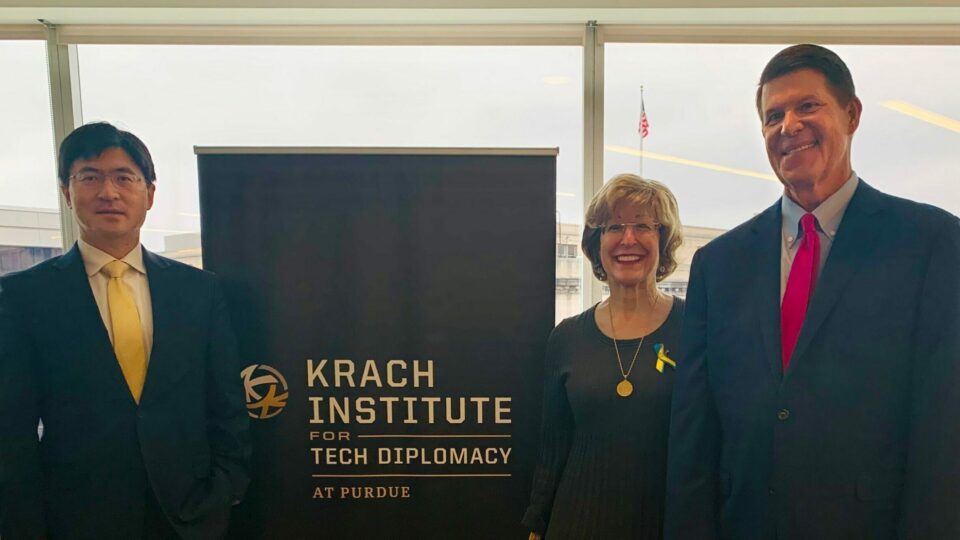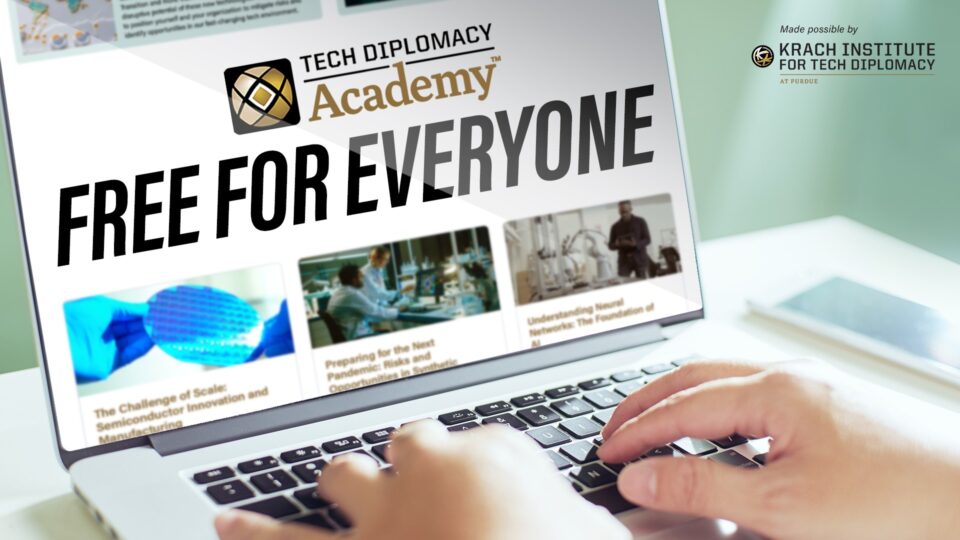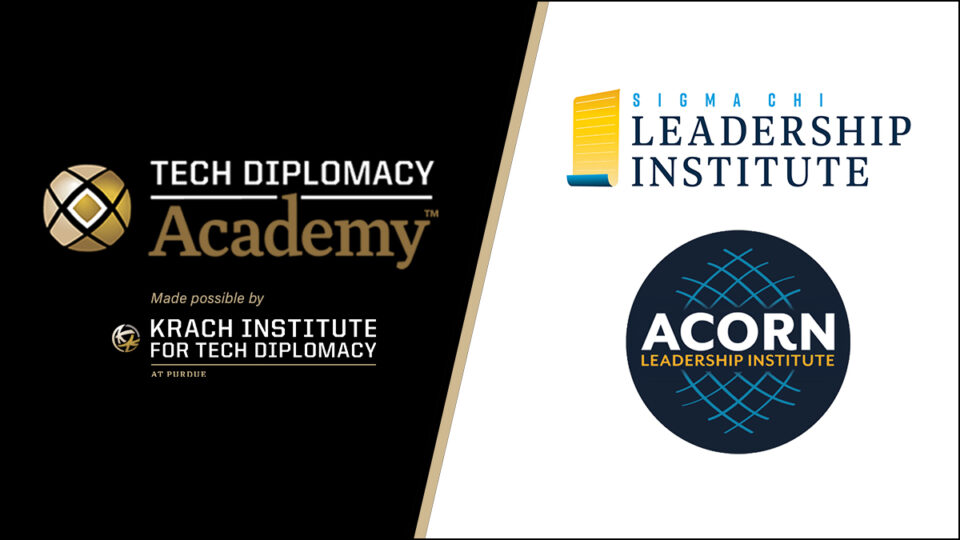Krach Institute for Tech Diplomacy at Purdue Opens in Honor of 2022 Nobel Peace Prize Nominee Keith Krach
04.05.22

Institute Co-Founded by Krach, Focused on Advancing Freedom Through the Trust Principle
WEST LAFAYETTE, IN, and WASHINGTON, DC, April 5, 2022 – At an April 5th, 2022 ceremony attended by government, business, academic, and civil society leaders, the Krach Institute for Tech Diplomacy at Purdue launched. The Institute was co-founded by the 2022 Nobel Peace Prize nominee and past Chairman of Purdue University’s Board of Trustees Keith Krach and the Dean of Purdue’s College of Engineering and former Science and Technology Adviser to the U.S. Secretary of State Dr. Mung Chiang.
The nonpartisan Krach Institute for Tech Diplomacy at Purdue is the world’s first and only institution focused on Tech Statecraft, a new model of transformational diplomacy that integrates high-tech strategies with foreign policy tools and national security to ensure trusted technology is used to advance freedom. The Krach Institute for Tech Diplomacy leverages Purdue University’s strength in innovation, deep expertise in technology, and global prowess in educating transformational leaders, combined with its members’ track record of building market-leading high-tech companies, onshoring strategic supply chains, and building global trust networks.
“A single vision is one more than most people will ever produce. Keith Krach is working on the most recent of a long string of them. And unlike so many visionaries, he never fails to make his new conceptions real, and powerfully successful,” observed Mitch Daniels, President of Purdue University, and former Governor of Indiana. “Tech diplomacy is a new frontier of foreign policy, as engineering and science drive innovations crucial to national and global policies today. The Krach Institute will be a cradle of tech diplomacy, contributing to U.S. foreign policy debates with technology expertise.”
The Institute’s focus stems from Krach’s U.S. Senate hearing leading to his unanimous confirmation as Under Secretary of State. Krach was asked about his strategy for defending freedom against authoritarian aggression. Krach responded: “My focus will be on harnessing our three most powerful areas of competitive advantage by strengthening our partnerships with friends and allies, leveraging the innovation and resources of the private sector, and amplifying the moral high ground of our democratic trust principles to advance peace and prosperity.”
After his confirmation, Krach recruited Chiang to his team. During their public service, they deployed the “Trust Principle” doctrine to defend against technological authoritarianism, safeguard global economic security, preserve democracy in Taiwan, and protect human rights.
“It was a true blessing to serve with such a multi-dimensional leader and patriot like Mung at the State Department, and I am grateful beyond words to have the opportunity to do it again and continue the mission of advancing freedom,” said Krach. “I feel equally fortunate to have as our inaugural Director the very talented and visionary Bonnie Glick, whose leadership I’ve come to know and admire during her time at USAID and my time at the State Department.
“Technology must advance freedom,” said Mung Chiang, EVP for strategic initiatives, John A. Edwardson Dean of Engineering at Purdue University, and co-founder of the Krach Institute of Tech Diplomacy. “Through the nonpartisan Krach Institute of Tech Diplomacy, Purdue is defining the emergent and timely space of Tech Diplomacy. With global policy pioneers, such as President Mitch Daniels, Chair Keith Krach, Director Bonnie Glick, and a growing team of outstanding fellows and advisors, we will lead the interactions between critical technologies and U.S. foreign policy.”
“Preserving freedom for the next generation requires widespread adoption of trusted technology worldwide. Keith Krach has been a visionary leader in this realm. His ‘Trust Principle’-based approach to building alliances serves as a model for countering authoritarianism in the 21st Century, whether that is through 5G/6G, synthetic biology, semiconductors, or quantum computing” said Director Bonnie Glick. “The Krach Institute for Tech Diplomacy at Purdue now continues the bipartisan mission of advancing freedom through Tech Statecraft.”
Throughout Krach’s career, as a Silicon Valley CEO, America’s top economic diplomat, founder of the Global Mentorship Network, and Chairman of Purdue University’s Board of Trustees, Krach had been driven by his philosophy of “Transformation to the Power of Trust (T2).” In industry after industry, including robotics, engineering, eCommerce, education, philanthropy, diplomacy and even the way people sign, Krach created Trusted Tech categories, built Trusted Teams, formed Trusted Partnerships, developed Trust Standards, and constructed global Trust Networks.
Krach’s T2 strategies have had a transformative impact on society. “Mr. Krach has empowered people to accomplish more than they had ever imagined, resulting in a profound impact on GDP per capita, the speed of international commerce, STEM education, and the sustainability of our planet,” Indiana Senator Todd Young observed. “What he has chosen to do with his success demonstrates his character and devotion to causes that will leave this planet better for future generations.
Krach Nominated for 2022 Nobel Peace Prize
The launch of the Krach Institute for Tech Diplomacy follows Krach’s nomination for the Nobel Peace Prize and a year after Krach and his family were sanctioned by the Chinese government. When asked about his Nobel nomination by Fox Business host Liz Claman, he commented, “It really made me think about the heartbreaking violence in Ukraine and the tremendous courage of its people. Democracy is under threat with the totalitarian twins (Putin and Xi); we need the Trust Principle’s Alliance of Democracies more than ever.”
Only a strong U.S. response to this authoritarian challenge will ensure we all continue to live in peace by deterring further aggression,” said Air Force General and former Assistant Secretary of State for East Asian Affairs Dave Stilwell. “Keith Krach’s selfless service and ‘Trust Principle‘ doctrine demonstrate that strength and prove, yet again, the indispensability of American leadership. If ‘weakness breeds aggression,’ then strength deters it and fosters peace.”
Likewise, a recent Forbes article, 2022 Nobel Peace Prize Nominee Keith Krach’s “Trust Principle” Is Antidote To Authoritarianism, explained: “Krach’s ‘Trust Principle’ is based on democratic values. These include respect for the rule of law, property, press, human rights, national sovereignty, labor and the environment, and standards for transparency, integrity, and reciprocity. The ‘Trust Principle’ is the new basis for 21st century international relations. It stands as a peaceful alternative and antidote to Russia’s and China’s ‘Power Principle,’ a geopolitical framework rooted in brute power, coercion, and intimidation.”
“Mr. Krach understands the moral side of technology. He understands that if we don’t handle the technologies morally, responsibly, the world is going to go to hell,” said Miles Yu, professor of Chinese military history at the Naval Academy. “So, when we talk about sanctioning against Chinese human rights violations in Xinjiang, we’re talking about basically China’s use of their technology…a very sophisticated system of surveillance. It was Mr. Krach who led the campaign to sanction China’s technology firms, who were responsible for perpetrating this genocide.”
“Peaceful partnership, not fear mongering—that is the stark choice that Keith Krach has enabled through his years-long campaign and mission to unify the world around a common, peaceful technology accord, formally recognized today as the Clean Network alliance,” The Taipei Times article, US’ Keith Krach gets Nobel Nod, summarized. “Taiwan counts itself among the network’s ranks, creating the opportunity to recognize its sovereignty. Keith Krach’s attendant efforts regarding human rights abuses by China and Taiwan’s quest for independence are, in many ways, just different colors in the same noble cause that Mr. Krach pursues as a life purpose…The world truly is a better and safer place because of his courage and efforts.”
About the Krach Institute for Tech Diplomacy at Purdue:
The nonpartisan Krach Institute for Tech Diplomacy at Purdue is the world’s preeminent institution focused on Tech Statecraft, a new model of diplomacy that bridges the high-tech sector with the foreign policy and national security sectors to ensure trusted technology is used to advance freedom. The Krach Institute for Tech Diplomacy is a 501(c)(3) that leverages Purdue’s strength in innovation, deep expertise in technology, and global prowess in educating transformational leaders. It focuses on rallying our allies, leveraging the innovation of the private sector, and amplifying democratic values based on trust.
For more information, go to techdiplomacy.org. Follow the Krach Institute for Tech Diplomacy at Purdue on Twitter, LinkedIn, and YouTube.

